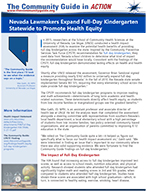Nevada Lawmakers Expand Full-Day Kindergarten Statewide to Promote Health Equity
Summary
 Researchers in Nevada used a CPSTF recommendation to inform a health impact assessment that examined the health benefits of providing full-day kindergarten throughout the state. The assessment found that increasing access to full-day kindergarten improves test scores, access to school meals, nutrition education and physical activity. The findings of the assessment led to the universal expansion of full-day kindergarten throughout Nevada. (Released 2019)
Researchers in Nevada used a CPSTF recommendation to inform a health impact assessment that examined the health benefits of providing full-day kindergarten throughout the state. The assessment found that increasing access to full-day kindergarten improves test scores, access to school meals, nutrition education and physical activity. The findings of the assessment led to the universal expansion of full-day kindergarten throughout Nevada. (Released 2019)
Lessons Learned
- Reference the Evidence The Community Guide is a valuable resource for public health projects because it aggregates credible, evidence-based research in one easy-to-search location. This can save researchers time and money by providing a solid foundation. Community Guide recommendations can be bolstered with additional local data, providing more context and support for recommended policy to local decision-makers.
- Community Involvement By combining the work of the research team with a steering committee that included professionals from relevant organizations and parents, the health impact assessment was well-rounded, and everyone felt fairly represented.
- Reflect on Successes When learning about new approaches, students can benefit by studying successful projects and using them as a road map to future impact.
Story
Shortly after UNLV released the assessment, Governor Brian Sandoval signed a measure providing nearly $142 million to universally expand full-day kindergarten throughout Nevada.1 In the fall of 2017, the Nevada state senate implemented Senate Bill 515, requiring that every elementary school across the state provide full-day kindergarten.2
The CPSTF recommends full-day kindergarten programs to improve reading and math achievement determinants of long-term academic and health-related outcomes. These determinants directly affect health equity, as students from low-income families or marginalized groups see the greatest benefits.3
Max Gakh, JD, MPH, is an assistant professor and associate director of health law at UNLV. He led the analysis team that completed the assessment alongside a steering committee with representatives from southern Nevada’s local health department, a local elementary school with a high percentage of students from low-income families, two policy-oriented community-based organizations, and an organization of parents committed to improving K-12 education in the state.
“We relied on The Community Guide quite a bit it helped us figure out specifically what to focus our health impact assessment on,” Gakh said. “We were interested in finding an issue that’s important to our community where there was also solid supporting evidence. We were fortunate to find the Community Guide findings on full-day kindergarten.”
The Impact of Full-Day Kindergarten
The HIA found that increasing access to full-day kindergarten improves test scores, as well as access to school meals, nutrition education, and physical activity. Research showed students who attended full-day kindergarten had significantly higher math and reading scores in 3rd and 5th grades, when compared to students who attended half-day kindergarten. Studies have shown these scores are associated with high school graduation which, in turn, is connected to healthy eating, exercise, smoking, heart disease, high blood pressure, diabetes, and cancer.4 These results were particularly important to decision makers in Nevada, where 4th and 8th graders perform below the national average and the high-school graduation rate is nearly 11% lower than the national average.5
The analysis team obtained student enrollment and test score data from publicly available government sources. During the 2013-2014 school year, 87% of Nevada’s 35,000 kindergarten-aged students enrolled in public schools had access to full-day kindergarten, while 13% only had access to half-day kindergarten. Many students without access to full-day kindergarten were also denied access to services traditionally offered through schools, such as meal programs, nutrition education, and physical activity.
Following the release of the HIA, state officials passed a resolution to expand access to full-day kindergarten. Beginning in the fall of 2017, 100% of kindergarteners had access to full-day kindergarten in Nevada.
Using the Experience to Teach Others
Following their success, Gakh began teaching a graduate-level course on health impact assessments, using full-day kindergarten as an example. Students complete assessments on a variety of topic areas using evidence-based recommendations, like those of the CPSTF, as the foundation for their work.
“The Community Guide is one of the first resources we introduce our students to,” Gakh said. “It’s a really good, solid place to go for thoughtful, aggregated, and well-thought-out research.”
1Full-Day Kindergarten. (2015, June 1). Retrieved July 25, 2019, from https://www.pewtrusts.org/en/research-and-analysis/data-visualizations/2015/hia-map/state/nevada/full-day-kindergarten
2Elementary School and Pre-School FAQ. (n.d.). Retrieved July 25, 2019, from http://www.doe.nv.gov/home/FAQs/Elementary_School_and_Pre-School_FAQ/
3Health Equity: Full-Day Kindergarten Programs. (2011, December). Retrieved August 2, 2019, from https://www.thecommunityguide.org/findings/social-determinants-health-full-day-kindergarten-programs.html.
4Braveman P, Egerter S, Williams DR. The social determinants of health: coming of age. Annual Review of Public Health 2010; 32:381-98
5Full Day Kindergarten in Nevada – A Health Impact Assessment. University of Nevada Las Vegas. Retrieved July 25, 2019, from https://www.unlv.edu/sites/default/files/story_attachments/708/Full Day Kindergarten HIA FINAL 5-27-15.pdf